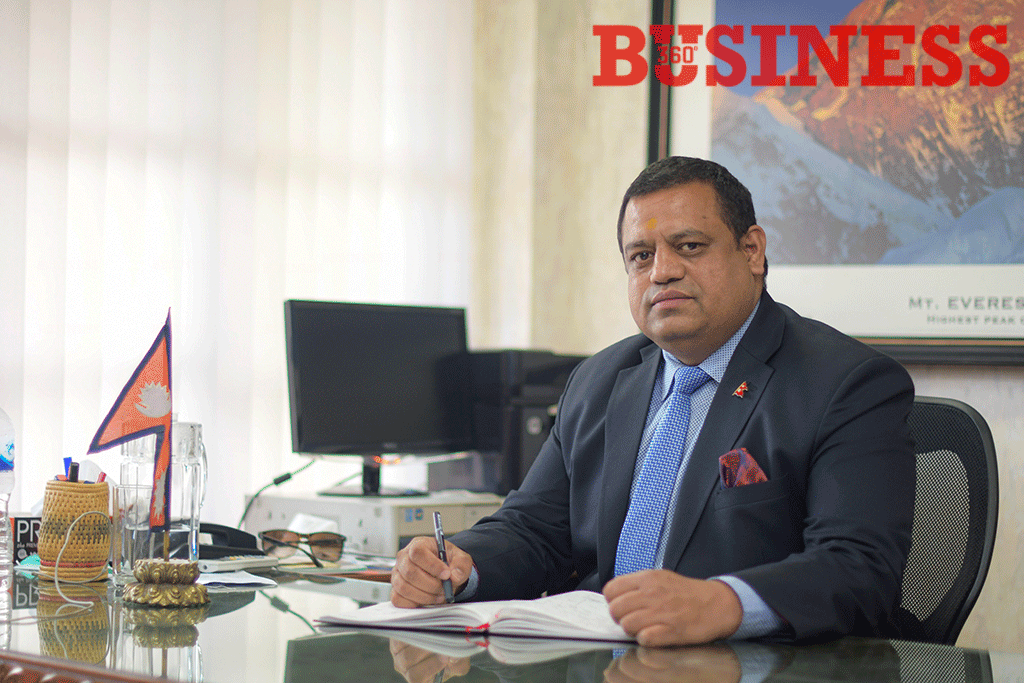
Dr. Dhananjay Regmi is the recently appointed Chief Executive Officer of Nepal Tourism Board and an eminent environmental activist in Nepal. He has been active in the field of ecological restoration and served as the President of the Society for Ecological Restoration (SER) Nepal. He is also Managing Director of Shibani Hydropower Company and Chairman of Himalayan Research Expedition (HRE) Nepal, a tourism company that focuses on eco-friendly tours and treks for mountain researchers and scholars. He also owns the Himalayan North-Face Resort in Lukla.
Dr. Regmi obtained a PhD in Environmental Earth Science from the Graduate School of Environmental Earth Science at Hokkaido University in Sapporo, Japan in 2006. Prior, he was a Geography teacher in Budhanilkantha Higher Secondary School and as a Research Assistant in the Himalayan Climate Center in Kathmandu.
After completing his PhD, he served as a Post Doctoral Research Fellow to the Global Land Project, NODAL office in Sapporo, Japan. He has completed a three-month course on dendrochronological research at Arizona University, USA as a Haury Fellow. In Nepal, he has been working as an adjunct professor in the Central Department of Geography at Tribhuvan University.
In an interview with B360’s Dibesh Dangol, Dr. Dhananjay Regmi talks about the impact of Covid-19 on the tourism industry, measures NTB is and will be taking to revive tourism in the country, and his agenda going forward. Excerpts:
 After the pandemic situation eases, we want to focus on the promotion of the natural beauty of Nepal. Nepal is more than just the country of Mt. Everest and the birthplace of Gautam Buddha. We must explore new options for its promotion. Also, tourism businesses in Nepal is seasonal currently and during off-season when business is low in the sectors of mountaineering or trekking, porters and guides have to find other options of work like agriculture. I am not saying this is bad but what I want is make them secure and sustainable in the tourism field itself during all seasons. To create such opportunities, we need to create hill-stations and build cultural trekking and hiking trails which we can sell to domestic or international tourists during off-seasons. Though Nepal is a landlocked country, we have river beaches which can also be used to create tourism attraction destinations.
In addition, we have always been targeting backpackers. But, it is suggested that after the pandemic people with travel a lot less because of financial reasons, thus we should be targeting high level tourists that considerably have enough disposable income like doctors, engineers, businesspeople, etc.
We are also planning cleanliness and rebuilding campaigns with concerned government agencies and tourism stakeholders in which we will be employing tourism workers who have been affected financially by the pandemic. We will be providing them with additional skill trainings which they can use to develop further.
After the pandemic situation eases, we want to focus on the promotion of the natural beauty of Nepal. Nepal is more than just the country of Mt. Everest and the birthplace of Gautam Buddha. We must explore new options for its promotion. Also, tourism businesses in Nepal is seasonal currently and during off-season when business is low in the sectors of mountaineering or trekking, porters and guides have to find other options of work like agriculture. I am not saying this is bad but what I want is make them secure and sustainable in the tourism field itself during all seasons. To create such opportunities, we need to create hill-stations and build cultural trekking and hiking trails which we can sell to domestic or international tourists during off-seasons. Though Nepal is a landlocked country, we have river beaches which can also be used to create tourism attraction destinations.
In addition, we have always been targeting backpackers. But, it is suggested that after the pandemic people with travel a lot less because of financial reasons, thus we should be targeting high level tourists that considerably have enough disposable income like doctors, engineers, businesspeople, etc.
We are also planning cleanliness and rebuilding campaigns with concerned government agencies and tourism stakeholders in which we will be employing tourism workers who have been affected financially by the pandemic. We will be providing them with additional skill trainings which they can use to develop further.
You were appointed CEO of NTB in end January when you were probably focused on the Visit Nepal 2020 tourism campaign. But the Coronavirus pandemic happened. How are you, NTB and the tourism industry coping in the current situation?
When I joined NTB I had been working on a separate project and had separate agendas that encompassed the whole tourism industry including government institutions associated with this industry. I was focused on creating long term agendas and master plan as well as investment strategies and policies both for international and domestic markets which were unclear. I also found that the relationship and communication between government agencies was weak. I also wanted to find out the actual contribution of tourism to the GDP of Nepal. These were the things I wanted to work on besides the tourism campaign. But because of the Covid-19 pandemic situation, the whole scenario has completely changed and we have had to change plans into three areas of focus. The first is to send stranded tourists back to their homeland safely. Second is to create relief packages for tourism stakeholders and to protect tourism workers by studying the impact of Covid-19 on the tourism industry of Nepal in detail. Next is to make protocols as to when we can open the tourism businesses whether it is airlines, hotels, trekking, travelling, restaurants, etc. Also, since it’s been reported that international travel will be minimal, we have made plans of promoting domestic tourism after the pandemic and lockdown situation ends. After the pandemic situation eases, we want to focus on the promotion of the natural beauty of Nepal. Nepal is more than just the country of Mt. Everest and the birthplace of Gautam Buddha. We must explore new options for its promotion. Also, tourism businesses in Nepal is seasonal currently and during off-season when business is low in the sectors of mountaineering or trekking, porters and guides have to find other options of work like agriculture. I am not saying this is bad but what I want is make them secure and sustainable in the tourism field itself during all seasons. To create such opportunities, we need to create hill-stations and build cultural trekking and hiking trails which we can sell to domestic or international tourists during off-seasons. Though Nepal is a landlocked country, we have river beaches which can also be used to create tourism attraction destinations.
In addition, we have always been targeting backpackers. But, it is suggested that after the pandemic people with travel a lot less because of financial reasons, thus we should be targeting high level tourists that considerably have enough disposable income like doctors, engineers, businesspeople, etc.
We are also planning cleanliness and rebuilding campaigns with concerned government agencies and tourism stakeholders in which we will be employing tourism workers who have been affected financially by the pandemic. We will be providing them with additional skill trainings which they can use to develop further.
After the pandemic situation eases, we want to focus on the promotion of the natural beauty of Nepal. Nepal is more than just the country of Mt. Everest and the birthplace of Gautam Buddha. We must explore new options for its promotion. Also, tourism businesses in Nepal is seasonal currently and during off-season when business is low in the sectors of mountaineering or trekking, porters and guides have to find other options of work like agriculture. I am not saying this is bad but what I want is make them secure and sustainable in the tourism field itself during all seasons. To create such opportunities, we need to create hill-stations and build cultural trekking and hiking trails which we can sell to domestic or international tourists during off-seasons. Though Nepal is a landlocked country, we have river beaches which can also be used to create tourism attraction destinations.
In addition, we have always been targeting backpackers. But, it is suggested that after the pandemic people with travel a lot less because of financial reasons, thus we should be targeting high level tourists that considerably have enough disposable income like doctors, engineers, businesspeople, etc.
We are also planning cleanliness and rebuilding campaigns with concerned government agencies and tourism stakeholders in which we will be employing tourism workers who have been affected financially by the pandemic. We will be providing them with additional skill trainings which they can use to develop further.
Nepal was clearly not prepared for a global emergency such as the COVID 19. Did NTB have any contingency plans for crisis situations like these?
NTB had a crisis management unit for emergency situations which we had to modify for the Covid 19 pandemic. Various ministries like tourism, home and foreign affairs along with NTB are the part of the crisis unit. Our first priority was the stranded tourists in Nepal and to send them back to their home country safely. We ran a campaign called Stranded in Nepal as soon as the lockdown began and through this campaign were able to provide tourists with necessary information. Now the crisis management unit is focused on finding ways to open the tourism industry and provide financial assistance to tourism workers and stakeholders.How long do you forsee the impact of the pandemic lasting?
I have been asked this question a lot in recent times, but we don’t have actual statistical figures to show how much the pandemic has affected the tourism industry because the total data collection hasn’t been done till now. However, looking at the national and global economic situation, we can say that it has greatly affected not just the tourism industry but other industries as well. Because we lack the data, we have asked tourism stakeholders whether it be hotels, travel agencies, airlines, trekking and mountaineering companies to fill out an online form to gather the actual data regarding how much they and their workers have been affected by the pandemic and lockdown. Though it’s being said that the impact of Covid-19 will affect the tourism business for six months to the end of 2020, I think the impact will last longer. Because of the pandemic, international travel will be done to a minimal for a year to two which means the tourism industry will take at least three years to fully recover. During this difficult time, we need to promote domestic tourism which can be a great learning point for tourism stakeholders. We can learn the spending habit of domestic tourists as well as build new tourism products so that they can be tested and reviewed in the domestic tourists before going to international market. Nepali people need to come together to raise the economy of the country and put Nepal’s tourism industry back into the global market.
Published Date: May 30, 2020, 12:00 am
Post Comment
E-Magazine

Click Here To Read Full Issue
RELATED Face 2 Face


.jpg)
.jpg)
.jpg)